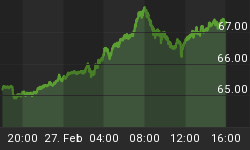Currently, Wall Street is divided into two camps: those who feel the Fed should fight recession, and those who feel it should fight inflation. The former feel that a recession can only be avoided if the Fed rescues the economy from the imploding housing market. To these analysts, inflation is not a problem as it will be contained by slower growth. The other camp maintains that the housing slowdown is not significant enough to derail the otherwise healthy U.S. economy, and should therefore not distract the Fed from its primary mission of fighting inflation. As usual on Wall Street, both camps have it wrong.
Both camps incorrectly assume that inflation (rising prices) and recession are somehow mutually exclusive. By concentrating solely on the demand side of the price equation, Wall Street ignores the impact of supply. In reality, strong growth increases the supply of goods and helps keep a lid on consumer prices. Weak growth reduces the supply of goods and has the opposite effect.
Similar to the 1970s we are experiencing what economists call "stagflation," a period when economic contraction occurs simultaneously with high inflation. Now that Bernanke has pulled the rug out from under the dollar, our currency has become a monetary black hole into which foreign lenders will be increasingly reluctant to trust their savings. The threat of substantial exchange rate losses will compel foreigners to demand greater compensation for loans to Americans. Thus what the Fed giveth in lower short-term rates, foreign creditors will take away in higher long-term rates. Higher long-term interest rates, tighter lending standards, and a reduction in the availability of credit will suppress asset values and consumer spending pushing the economy deeper into recession.
However, as the dollar falls, far fewer foreign products will be imported into the United States, and more domestic products will be exported from the United States. A reduction in the domestic supply of goods will offset the diminished demand brought about by the recession, causing consumer prices to rise. So while Americans will indeed buy fewer products, they will pay much higher prices for those that they do. The bottom line is that consumer prices will be headed much higher, not just despite the recession, but as a direct result of it!
Many economists acknowledge that a falling dollar will put upward pressure on import prices, but few consider its effects on domestically produced goods. For one thing, a weak dollar by definition raises the prices of globally traded, dollar-denominated commodities, such as oil, causing raw material costs for domestic manufacturers to rise. Also, as a weaker dollar causes foreigners to demand higher interest rates on the money they lend us, domestic capital cost will rise as well.
Further, a global market allows domestic producers to sell their products to the highest bidders, wherever they may reside. For example if a lobster fisherman in Maine can get a better price for his catch in Europe, he will sell to Europeans. A weaker dollar simultaneously makes domestically caught lobster more affordable in Europe as it makes them more expensive here. As domestic demand falls, foreign demand picks up. The result is that fewer Americans will eat lobsters, and those who do will be forced to pay more for the privilege.
In addition, many of the products that we export will not be manufactured, adding little to our GDP and creating few jobs in the process. These products will include used consumer goods, such as cars, appliances, consumer electronics, furniture, etc. Poorer Americans will be forced to sell such possessions so they can afford to buy other goods they will need more, such as food and heating oil. Of course, armed with more valuable currencies, foreigners will have lots of extra purchasing power with which to buy those used consumer goods Americans can no longer afford to keep, as items such as food and heating oil will be a lot cheaper for them. In other words, they will be repossessing all the stuff they sold us on credit.
Unfortunately, the choice that we all are currently facing is much more difficult than deciding to fight recession or inflation. Focusing on one foe at a time is a luxury we have long ago squandered. In reality, we are facing an assault from all sides. Our best course would be to hunker down, settle in for a nasty recession, defend our currency, and try to save enough so that when the dust settles we can try to build anew.
For a more in depth analysis of the tenuous position of the American economy, the housing and mortgage markets, and U.S. dollar denominated investments, read my new book "Crash Proof: How to Profit from the Coming Economic Collapse." Click here to order a copy today.
More importantly take action to protect your wealth and preserve your purchasing power before it's too late. Discover the best way to buy gold at www.goldyoucanfold.com, download my free research report on the powerful case for investing in foreign equities available at www.researchreportone.com, and subscribe to my free, on-line investment newsletter at http://www.europac.net/newsletter/newsletter.asp.















